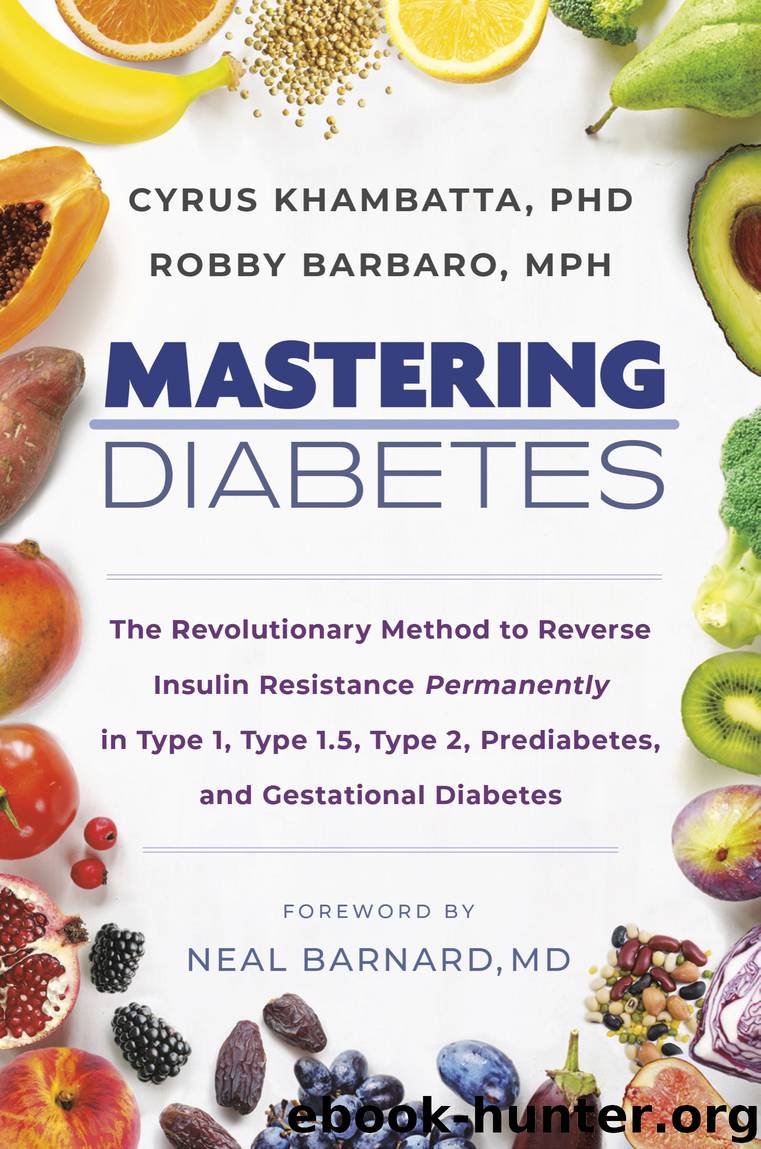Mastering Diabetes by Cyrus Khambatta PhD & Robby Barbaro MPH

Author:Cyrus Khambatta, PhD & Robby Barbaro, MPH
Language: eng
Format: epub
Publisher: Penguin Publishing Group
Published: 2020-02-17T16:00:00+00:00
Can You Absorb Enough Fat-Soluble Vitamins?
Now that you know the basic functions of fat-soluble vitamins and how to obtain them from your diet and sun exposure, still an important question remains: Can your body absorb enough fat-soluble vitamins when eating a low-fat plant-based whole-food diet containing a maximum of 15 percent calories from fat?
First, let’s review the (flawed) research that makes people believe they have to eat fat-rich foods like avocados, nuts, seeds, coconut meat, or oils in order to absorb fat-soluble vitamins. One study published in the American Journal of Clinical Nutrition found that taking a beta-carotene supplement with no food after 12 hours of fasting resulted in no detectable change in beta-carotene levels in the blood. When patients took the same beta-carotene supplement with two-thirds of a pint of almond ice cream containing 200 grams of fat, the amount of beta-carotene in their blood increased 2.5-fold. While it is true that adding fat to a meal increases beta-carotene absorption in comparison with a zero-fat meal, keep in mind that when you eat meals containing green light foods, your fat intake is usually between 3 and 10 grams per meal, which significantly improves the absorption of beta-carotene and other fat-soluble vitamins.
A famous study published by researchers at Ohio State University in 2013 and funded by the California Avocado Commission showed that eating either salsa or a small salad with either avocado or avocado oil enhanced the absorption of alpha-carotene, beta-carotene, lutein, and lycopene, in comparison with low-fat and zero-fat meals. In this study, the first control meal contained a total of zero grams of fat from a fat-free salsa and fat-free bread. The second control meal contained a small salad with a total of 0.7 grams of fat. In comparison with both control diets, eating avocado or avocado oil significantly enhanced fat-soluble vitamin absorption. However, both control meals contained unrealistically low amounts of fat, making it challenging to interpret their results. Another design flaw of this study was the two-week washout period in which participants were instructed to avoid carotenoid-rich foods, which put the subjects in an unrealistic state of carotenoid deficiency. Without this unrealistic deficiency, which does not apply to those eating a nutrient-dense diet, the results might have been much less dramatic. This type of research is designed to get a specific result to benefit industry and is not applicable to those who maximize their nutrient density with every bite.
Some research suggests that optimal beta-carotene absorption occurs with as little as 5 grams of fat per day in children. Another study in children found that either 2.4 grams of fat per meal or 21 grams of fat per day is sufficient for optimal utilization of vitamin A. Research conducted in adults suggests that eating as little as 3 to 5 grams of fat per meal results in optimal absorption of alpha-carotene, beta-carotene, and vitamin E, and that higher-fat meals improve only lutein absorption. We have worked hard to ensure that meals in the Mastering Diabetes Method contain
Download
This site does not store any files on its server. We only index and link to content provided by other sites. Please contact the content providers to delete copyright contents if any and email us, we'll remove relevant links or contents immediately.
When Breath Becomes Air by Paul Kalanithi(7294)
Why We Sleep: Unlocking the Power of Sleep and Dreams by Matthew Walker(5680)
Paper Towns by Green John(4191)
The Immortal Life of Henrietta Lacks by Rebecca Skloot(3843)
The Sports Rules Book by Human Kinetics(3613)
Dynamic Alignment Through Imagery by Eric Franklin(3511)
ACSM's Complete Guide to Fitness & Health by ACSM(3481)
Kaplan MCAT Organic Chemistry Review: Created for MCAT 2015 (Kaplan Test Prep) by Kaplan(3437)
Introduction to Kinesiology by Shirl J. Hoffman(3317)
Livewired by David Eagleman(3154)
The River of Consciousness by Oliver Sacks(3008)
Alchemy and Alchemists by C. J. S. Thompson(2923)
The Death of the Heart by Elizabeth Bowen(2921)
Descartes' Error by Antonio Damasio(2757)
Bad Pharma by Ben Goldacre(2744)
The Gene: An Intimate History by Siddhartha Mukherjee(2510)
Kaplan MCAT Behavioral Sciences Review: Created for MCAT 2015 (Kaplan Test Prep) by Kaplan(2501)
The Fate of Rome: Climate, Disease, and the End of an Empire (The Princeton History of the Ancient World) by Kyle Harper(2452)
The Emperor of All Maladies: A Biography of Cancer by Siddhartha Mukherjee(2446)
